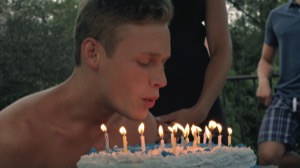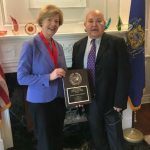
Henry Gamble’s Birthday Party is a picture, above all else, about conversions: religious, moral, sexual and familial. Henry, our handsome, young protagonist, is about to spend his 17th birthday with his friends, both religious and secular, his parents and their church friends – the “adults” – at a pool party of his parent’s making. The various cast members’ perturbations either conclude successfully by the end of the picture or they don’t and, for some, the consequences are devastating.
This is Stephen Cone’s ninth effort and another of his meditations on religion and sexuality. Like Henry, Stephen grew up struggling with his sexuality while carrying the albatross of his Southern Baptist minister father’s religiosity around his neck. (The Chicago-based Cone grew up in South Carolina, the prong on the buckle of the Bible Belt.) His film wrestles with a theme that, despite its nagging persistence in the LGBTQ community, is explored not nearly as much as it should be in queer cinema. (Check out Sigourney Weaver in Prayers for Bobby.)
Henry Gamble’s Birthday Party was released in 2015 but is just now being released by Wolfe Video for multiplatform viewing and will be available May 3. San Diego LGBT Weekly caught up with actor Cole Doman (Henry Gamble) and writer-director Stephen Cole to further explore the various tensions that pit the spirit against the flesh.

San Diego LGBT Weekly: Henry is quite cruel to Logan, his closeted young friend, at least at the beginning of the picture. In one of his earliest interactions with him, when they are grabbing hors d’oeuvres, Logan intentionally brushes his arm against his and he commands him to “Stop.” Where does that cruelty come from?
Cole Doman: Being told “stop” is way kinder than the emotional and physical abuse Logan has probably experienced from his other peers. In the beginning of the film, Henry is uncomfortable being alone with Logan because of what people might assume. He acts out of fear – both of what people might think of him but also what he might discover in himself.
A lot of your part comes in reactions, to other people’s behaviors, your growing self-awareness of your sexuality. What or who did you draw on in your own life to help inform your performance?

CD: As a young gay man, especially one living among a community that deems homosexuality as sinful, there is a pressure to be silent. Growing up different than the other boys my age, I saw myself as an “other,” which can be really lonely in those pivotal years of young adulthood. You feel like your voice isn’t as important. Henry, by nature, is an observer – more so than I am. By taking on that role, it makes the process of identifying sexuality difficult when he rarely reflects back on himself. At his party, everything is being flashed before his eyes among such a dynamic, diverse group that he starts to see these bare-skinned bodies in a new light. Henry finally discovers the deepest truth of his attraction.
In what ways are you or are you not religious?
CD: I was raised in a large, Irish-Catholic family in Philadelphia. Faith was a big part of my childhood between Sunday mass and Catholic school. After I left Catholic school by my own volition, my relationship with my faith started becoming less important to me. My religious upbringing molded my moral code of what I see as right and wrong, good and bad. I’m currently not a practicing Christian, and wouldn’t identify as one.

What’s your favorite attribute of Henry’s? Your least? Why? What scene in your mind best crystallizes Henry’s internal conflicts?
CD: My favorite thing about Henry is his openness. He is able to take in what people say to him and truly understand their perspective. I take things in and immediately attach a judgement to it. I don’t mean a judgement in a derogatory way, but I’m much quicker to form an opinion about something than Henry. To a degree, I envy that in him. My least favorite attribute of Henry’s is probably his dependence on other people to make decisions for him – he is a bit of a pushover. It’s definitely a contributing factor as to why he is experiencing his attraction to men so late in his young adulthood. The scene that best crystalizes Henry’s internal conflict is most likely the scene with Christine and Heather, when Christine tells him that she’s gay. For the first time, Henry hears about other boys being sexual together in such a candid way. It totally throws him off.
Boys in The Band has a similar premise, in this case a group of gay men gathering one evening on the cusp of a revolution, warts and all. Do you see any parallels?

Stephen Cone: I’ve never read or seen Boys in the Band, actually, but of course have heard of it. I didn’t really have any theatrical references for this film, despite my own background as a stage actor, but I did have a few cinematic references, some of which take place over the course of an evening, like John Huston’s The Dead. Arnaud Desplechin’s A Christmas Tale and Jonathan Demme’s Rachel Getting Married were also on my mind.
I read somewhere that you have no formal film training. Is that true? If so, how did you go about learning your craft? Who are some of your influences?
SC: That’s true; I’ve never taken a filmmaking class. I was an actor in college, but a lifelong lover of film and always knew I’d eventually make movies. I have basically learned by doing, making more or less one movie per year, either a short or a feature, for the past decade or so. They aren’t all good, not even close. I had to get a few out of my system before I started to really know what I was doing.

What scene in your mind best crystallizes Henry’s internal conflict?
SC: This might be an easy answer, but I’d say the opening scene, wherein he finds himself in an ideal place with a sexually incompatible person.
Let’s talk about Elizabeth Laidlaw whose performance was off the charts! Where did you find her?
SC: She’s been a force in Chicago theater for many, many years! This town is packed with astonishing stage performers like her and Francis Guinan, who plays Larry and was a founding member of Steppenwolf, alongside Gary Sinise, John Malkovich and the whole gang. Anyway, my casting directors Mickie Paskal and Jennifer Rudnicke brought in a lot of wonderful actresses for the role of Kat, but Elizabeth got the gig. I’m so proud of that performance; she’s dazzling, isn’t she?
Are there any disadvantages/challenges to being both the writer and director? If so, what and how do you resolve them?
SC: I enjoy doing both, it’s my comfort zone and I find it really exhilarating, but I do suppose the primary disadvantage is the lack of anyone to blame but myself if something doesn’t work. There’s nothing really to resolve there, I just have to keep growing and hope that I’ll keep getting better.
(P.S. Keep an eye on Elizabeth Laidlaw’s Kat Gamble who anchors the film in one of 2015’s most sublime performances.)















